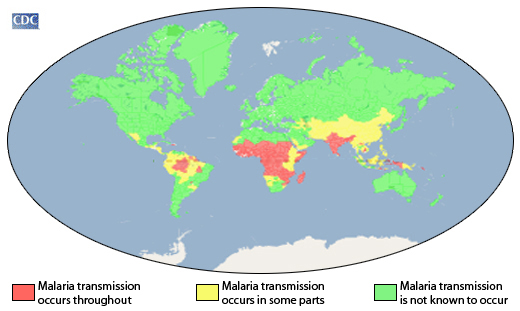Where Malaria Occurs
Where malaria is found depends mainly on climatic factors such as temperature, humidity, and rainfall. Malaria is transmitted in tropical and subtropical areas, where
- Anopheles mosquitoes can survive and multiply
- Malaria parasites can complete their growth cycle in the mosquitoes ("extrinsic incubation period").
Temperature is particularly critical. For example, at temperatures below 20°C (68°F), Plasmodium falciparum (which causes severe malaria) cannot complete its growth cycle in the Anopheles mosquito, and thus cannot be transmitted.

This map shows an approximation of the parts of the world where malaria transmission occurs. For more detailed information about the occurrence of malaria transmission in specific countries, please use the interactive Malaria Map Application.
In many malaria-endemic countries, malaria transmission does not occur in all parts of the country. Even within tropical and subtropical areas, transmission will not occur
- At very high altitudes
- During colder seasons in some areas
- In deserts (excluding the oases)
- In some countries where transmission has been interrupted through successful control/elimination programs.
Generally, in warmer regions closer to the equator
- Transmission will be more intense
- Malaria is transmitted year-round.
The highest transmission is found in Africa South of the Sahara and in parts of Oceania such as Papua New Guinea.
In cooler regions, transmission will be less intense and more seasonal. There, P. vivax might be more prevalent because it is more tolerant of lower ambient temperatures.
In many temperate areas, such as western Europe and the United States, economic development and public health measures have succeeded in eliminating malaria. However, most of these areas have Anopheles mosquitoes that can transmit malaria, and reintroduction of the disease is a constant risk.
Get email updates about Malaria
To receive email updates about this page, enter your email address:
Contact Us:
- Centers for Disease Control and Prevention
1600 Clifton Rd
MS A-06
Atlanta, GA 30333 - Health care providers needing assistance with diagnosis or management of suspected cases of malaria should call the CDC Malaria Hotline:
770-488-7788 or 855-856-4713 toll-free
(M-F, 9am-5pm, eastern time). - Emergency consultation after hours, call:
770-488-7100
and request to speak with a CDC Malaria Branch clinician. - malaria@cdc.gov


